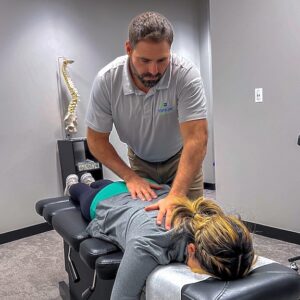Sleep apnea is one of the most common and disruptive sleep disorders, affecting an estimated 39 million U.S. adults. This condition, characterized by repeated interruptions in breathing during sleep, can lead to daytime fatigue, poor sleep, cardiovascular complications, and a diminished quality of life.
Many individuals with sleep apnea rely on CPAP (Continuous Positive Airway Pressure) machines, but not everyone finds them comfortable or effective. As a result, more people are exploring holistic, non-invasive alternatives — which spurs an interesting question: can chiropractors help sleep apnea?
Understanding the Root Causes of Sleep Apnea
There are two primary types of sleep apnea: obstructive sleep apnea, caused by physical airway blockages, and central sleep apnea, stemming from miscommunication between the brain and respiratory muscles. Obstructive sleep apnea is far more common and is often linked to excess weight, poor posture, and muscle laxity in the upper airway.
The consequences of untreated sleep apnea are significant — from sleep deprivation, impaired cognitive function, and emotional instability to increased risks of hypertension, stroke, and heart disease. People suffering from a sleep disorder also report mood swings, decreased productivity, and even depression due to chronic exhaustion. For many, these impacts make daily life harder to manage.
To consider how chiropractic care may help, it’s important to understand what causes sleep apnea from a physical perspective. In most obstructive sleep apnea cases, the soft tissues in the throat collapse during sleep, restricting airflow and triggering micro-awakenings to restore breathing. These pauses may last 10 seconds or longer and can occur dozens of times per hour.
While factors like obesity and enlarged tonsils are often discussed, less attention is paid to how spinal misalignment and postural imbalance can influence the airway. When the cervical spine is not aligned — due to forward head posture, tight upper back muscles, or misaligned vertebrae — it can place pressure on the trachea and surrounding muscles. This impedes the body’s ability to maintain an open airway during sleep, worsening sleep apnea symptoms and increasing the likelihood of fragmented restful sleep.
Tight neck muscles can contribute to airway narrowing, especially in individuals who sleep on their back. Additionally, restricted thoracic mobility can impair rib cage expansion and lung capacity, reducing oxygen intake during sleep. Physical limitations like these underscore why it’s so important to address spinal alignment and muscular tension to improve airway function and reduce the severity of sleep apnea.
How Chiropractic Care May Support Sleep Apnea Relief
So, how can chiropractic care improve sleep? Chiropractic adjustments can support improved breathing function and sleep quality in several ways:
- Spinal adjustment helps restore alignment to the cervical spine, relieving pressure on nerves and soft tissues that influence the airway.
- Targeted chiropractic adjustments can improve muscular tone and posture, both of which support open, unobstructed airways.
- Correction of postural distortions reduces pressure on the thoracic region, potentially improving rib cage flexibility and airflow.
- Therapies like decompression therapy may help release tension that limits proper upper body expansion.
- Posture correction also assists patients in aligning their head and neck position during sleep, a factor shown to influence the severity of sleep apnea.
Anecdotal evidence and patient stories often highlight noticeable changes after several weeks of targeted care. For instance, patients have reported fewer awakenings, deeper sleep, and improvements in overall sleep quality after regular visits focused on cervical and thoracic alignment.
Though scientific literature is still emerging, several small studies and clinical observations suggest that improved spinal alignment and nerve function may reduce the frequency of apnea events — especially when weaved into a personalized care plan.
Complementary Lifestyle Benefits of Chiropractic Care
Beyond directly supporting airway mechanics, chiropractic care contributes to a wide array of secondary benefits that influence sleep and wellbeing.
Chronic tension, stress, and misalignment all tax the nervous system, which in turn disrupts sleep hygiene and restorative function. This can further interfere with the body’s natural ability to regulate heart rate, breathing patterns, and hormone production.
Here’s how regular chiropractic treatment can help improve your quality of life:
- Reduced stress and muscle tension: Adjustments promote relaxation by lowering stress hormone levels and encouraging parasympathetic (rest-and-digest) nervous system activity.
- Enhanced circulation and lymphatic flow: Improved blood flow may reduce inflammation, a known trigger for both sleep disorders and systemic health issues.
- Nervous system regulation: Balanced nerve communication helps the body follow consistent sleep-wake cycles, which are vital for people experiencing sleep problems.
- Less reliance on sleep medications: With reduced discomfort and enhanced sleep quality, some patients find they can lower or eliminate the use of sleep aids.
By targeting these issues, chiropractic care creates a healthier foundation for long-term sleep improvement and overall wellness.
When to Combine Chiropractic with Traditional Treatments
One of the most common questions patients ask is whether chiropractic care help can serve as a full substitute for CPAP. While promising, chiropractic care is not a standalone cure for obstructive sleep apnea.
Instead, think of it as an enhancement to your existing care strategy. When paired with CPAP, oral devices, or weight management, chiropractic care can:
- Improve comfort and mobility.
- Address musculoskeletal issues that exacerbate sleep apnea symptoms.
- Reduce the need for invasive interventions down the line.
Patients with mild to moderate sleep apnea, those with postural issues, or those experiencing sleep disturbance may benefit most from this integrated approach. When traditional therapies alone fall short, these individuals often find that chiropractic care provides the added support needed to enhance airway function and promote more restful sleep.
It’s important to speak with a qualified chiropractor and a sleep specialist before making treatment changes — a collaborative, well-informed plan will help ensure the safest and most effective path forward. Taking a team-based approach allows patients to explore the full spectrum of care options, blending clinical effectiveness with all-encompassing support.
Holistic Support for Better Sleep
Can chiropractors help sleep apnea? The short answer: yes.
While chiropractic care is not a direct replacement for traditional sleep apnea treatment, it may help optimize posture, reduce musculoskeletal strain, and support better breathing and nervous system function — all of which contribute to improved sleep quality.
At Evolve Chiropractic, we understand the importance of individualized care. Our chiropractors focus on correcting the root causes of sleep issues, including spinal tension, poor posture, and nerve interference., we understand the importance of individualized care. Our chiropractors focus on correcting the root causes of sleep issues, including spinal tension, poor posture, and nerve interference.
If you’ve been struggling with sleep apnea, snoring, or low energy levels, we encourage you to schedule a consultation. We’ll help you explore how therapies like posture correction can be part of a broader wellness strategy for better sleep.





